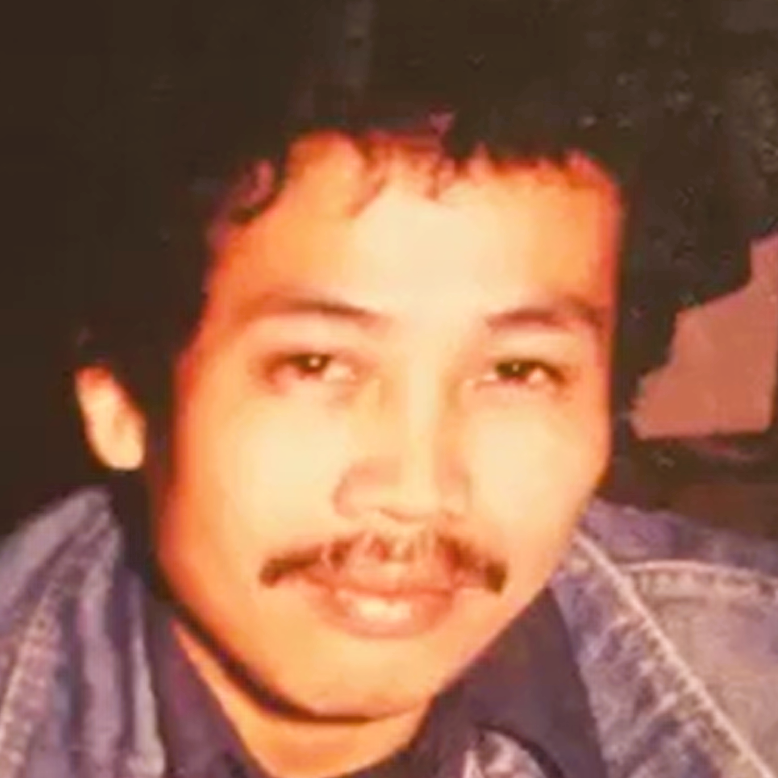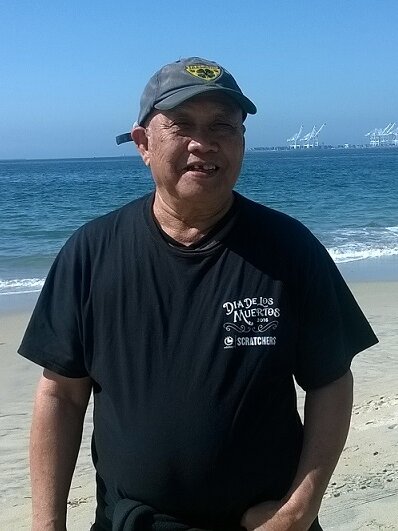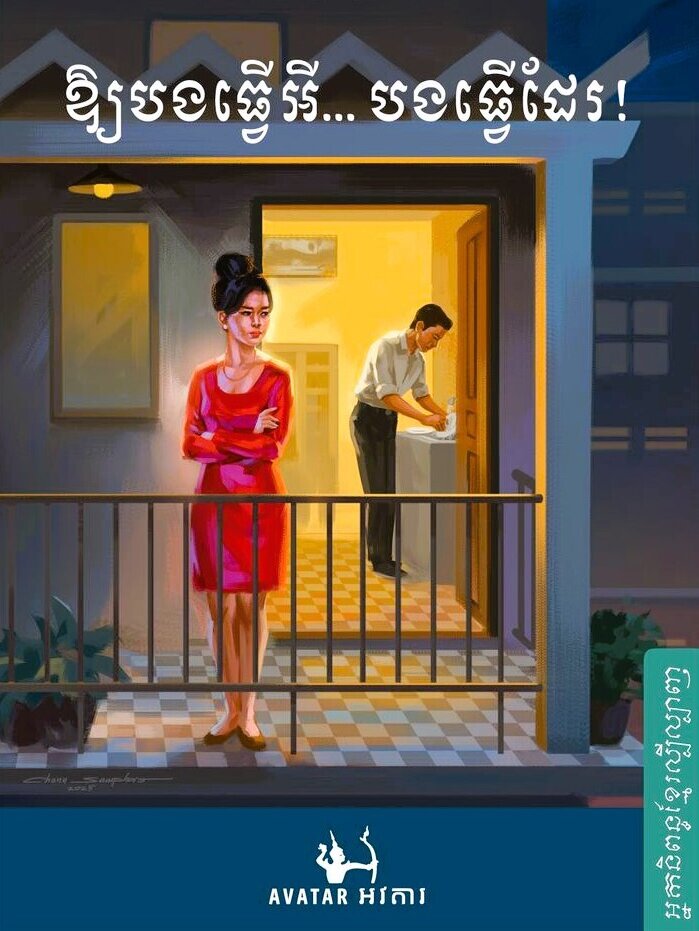Polin Soth

Soth Polin [also Suddh Pulin] សុទ្ធ ប៉ូលីន( b. 1943, Chroy Thmar village, Kompong Cham, Cambodia) is a Cambodian writer who published to great acclaim his first novel, A Meaningless Life, in 1965, during the Sangkum Reastr Niyum era, a renowned journalist who worked with Khmer Ekareach (The Independent Khmer, newspaper launched by his uncle Sim Var, and founded with writer Sin Kim Suy the newspaper and publishing house Nokor Thom - នគរធំ (The Great Kingdom).
Fluent both in French and Khmer, he studied Cambodian literature as well as Western philosophy since his childhood. His maternal great-grandfather was the poet Nou Kan, authot Teav-Ek ទាវឯក, a variation on the time-honored Khmer love story Tum Teav. In his only lenghty interview (by phone, in Sept. 2003)) with researcher and editor Sharon May (“Beyond Words: An Interview with Soth Polin,” In the Shadow of Angkor: Contemporary Writing from Cambodia, Frank Stewart and Sharon May eds., Chiang Mai, Silkworm Books, 2004, pp 11 – 22), he said he “learned to write in imitation of Cambodian poetry, but when I wrote on my own, it was in prose.” [p 13]
As a young, successful and controversial writer, Soth Polin was caught in the tumultuous politics of Cambodia in the shadows of the Vietnam war, becoming highly critical of Prince Sihanouk’s neutralism and the growing influence of communism on Cambodian intellectuals. Through Nokor Thom, he initially supported the pro-American coup of General Lon Nol before distancing himself, finally taking refuge in France right after the assassination of Thach Chea, Deputy Minister of Education and a close friend, on 4 June 1974.
Soth Polin was one of the first Cambodian [and non Cambodian, as a matter of fact] intellectuals to raise the alarm about the Khmer Rouge’s abuses in 1976 and 1977 publications bylined by French journalist Bernard Hamel. He was deeply affected by exile — and the killing of close family members by the Khmer Rouge, including his own father‑, remarking in the 2003 interview with Sharon May:
When you lose your country, you lose everything. If you’re a writer, you no longer get the echo of your readers. […] In West Berlin when I was homesick I translated that Cambodian song, “Phot Chong Chroy” [Missing the Cape.] [1] There were no other Cambodians there besides my wife. The song compares Cambodia to the woman you love. […] It says, “If I lose my country, I miss nothing, but if I lose a woman, I miss everything. I’m utterly desperate. In reality, the country and the woman are the same, and he misses it all. That song, I think, was written for a traveler.” [op.cit., p 15]
Exiled in Paris, he worked as a taxi driver, completed a French-Khmer dictionary, and worked on what was to become a cult novel, L’Anarchiste [The Anarchist], 1980. The narrator of this profundly dark- text allows in the closing lines: “Fils pieux, j’ai ruiné mes parents. Monarchiste, j’ai fait la révolution. Nationaliste, j’ai trahi les nationalistes. Est-ce que je suis bien moi?” [“A loving son, I wrecked my parents. A monarchist, I became a revolutionary. A nationalist, I betrayed that camp, too. Am I really myself?] [L’Anarchiste, 2025 ed., p 245].
1) Soth Polin in Long Beach, California, April 2017. 2) Reprint of ឱ្យបងធ្វើអី… បងធ្វើដែរ! [Whatever Your Wish…It’s My Command!], Avatar, 2025: book cover by Chan Somphos ចាន់ សម្ផស្ស .
Then, in 1982, he moved to California with his two sons (he had divorced shortly before the acclaimed French publication of his novel), allegedly to reunite with his mother and siblings who had recently emigrated to Long Beach, CA, USA. There, he worked as a cab (and airport shuttle) driver again, and
[I] tried everything to survive. Even gambling. I sold French make-up cream. […] I am ambivalent like Kierkegaard. That is why I like him so much. [Paraphrasing the famous philosopher] If you are married, you’re miserable. If you’re not, you’re miserable. [interview to Janet Wiscombe, “The power of his pen”, Long Beach Press-Telegram, 19 Nov. 1995.]
Soth Polin attempted to rekindle his editorial skills with the short-lived weekly magazine Nokor Thom in 1998 — in association with Cambodian-American businessman Chenda Bourng. Earlier, he had regurlarly published in Sereipheap [Freedom], a tabloid aimed at the Long Beach Cambodian community co-edited with Kem Narin, whom he lived several years before divorcing in 1995. There, he authored serialized novels — among them The Widow from L.A -, and broadcasted radio political programs, some in collaboration with brother-in-law Mam Sonando ម៉ម សូណង់ដូ (b. 13 February 1942), a Cambodian radio journalist and opposition politician. The congenial yet elusive fiction writer has also hinted to several unfinished manuscripts, including Angkor Princess, which he described as “a [fictional] diary written by Jayavarman VII, the greatest king of Cambodia, about his first love in Angkor.” [op. cit., p 18].
[1] ផុតចុងជ្រោយ [Passing-Missing the Headland] is an old Khmer song in which it is said at some point: “If I pass a cape, I miss nothing, but if I pass a nipple, I miss everything.” The metaphor equating the land to the female body continues throughout the lyrics.
Publications
[based on author and translator Christophe Macquet’s ongoing editing, translating and referencing work]
- [with Ke Sokhan & To Chhun] La composition française au DESPC, Phnom Penh, 1964.
- ជីវិតឥតន័យ [Une vie absurde- A Meaningless Life], Phnom Penh, 1965; repub. Nokor Thom, 1970s; repub. Paris, Institut de l’Asie du Sud-Est, c. 1980.
- ខូចសតិព្រោះកាមតណ្ហា [Lust Crazy-Fou de désir], Phnom Penh, 1965.
- ស្នេហ៍អពមង្គល [Misérables amours — Wretched Love], Phnom Penh, 1965.
- អូនជាម្ចាស់ស្នេហ៍ [You Are the Owner of Love], Phnom Penh, 1966.
- ក្ស័យតែម្ដងទេ (We Die Only Once, Phnom Penh, 1967).
- ស្នេហ៍អពមង្គល [ Phnom Penh, 1965].
- Contes et récits du Cambodge, Phnom Penh, Pich-Nil Éditeur, 1966.
- អូនជាម្ចាស់ស្នេហ៍ [Tu es l’amour de ma vie — You’re Love Supreme], Phnom Penh, 1966.
- ក្ស័យតែម្ដងទេ [On né meurt qu’une fois — Blind Everytime], Phnom Penh, 1967.
- ចំតិតឥតអាសូរ [Sans pitié, les fesses en arrière — Showing My Ass with No Mercy or Pitiless Provocation], Phnom Penh, 1967. [banned in Cambodia, clandestinely repub. as ចំតិតទៀតហើយ [Showing My Ass Just a Little More]. [novel tr. and adapted by Soth Polin to become the first part of L’Anarchiste (1980)].
- បុរសអផ្សុក [Un homme s’ennuie — Bored Man] Phnom Penh, 1968.
- ឱ្យបងធ្វើអី… បងធ្វើដែរ [Tout ce que tu me diras de faire.. Je le ferai! — Anything You’ll Tell me to Do…I will!] : 1.ការទាក់ទងគ្នា… 2. បង្គាប់មកបងចុះអូន!…3.អ្វីៗដែលផ្លាស់ប្ដូ!… 4.ឲ្យបងធ្វើអី… បងធ្វើដែរ! Phnom Penh, 1969. | repr. ឱ្យបងធ្វើអី… បងធ្វើដែរ! [Whatever You Order Me… I’ll do!], preface by Chuth Khay ខ្ជិត ខ្យៃ, Phnom Penh, Avatar Publishing, 2025, 236 p.
- [from ឲ្យបងធ្វើអី… បងធ្វើដែរ] ការទាក់ទងគ្នា [Communicate, They Say — Communiquer, disent-ils]: 1/ Japanese tr. as ひとづきあい by Tomoko Okada (岡田知子), Contemporary Cambodian Short Stories — Translation and Publishing (現代カンボジア短編集 — 翻訳出版,), Tokyo University of Foreign Studies, The Daido Life International Culture Foundation (大同生命国際文化基金), 2001. 2/ French tr. as Communiquer, disent-ils… by Christophe Macquet, Europe 889, “Écrivains du Cambodge”, May 2003, and MEET bilingual review 15, Porto Rico/Phnom Penh, 2011. 3/ Eng tr. from Christophe Macquet’s French tr. as Communicate, They Say by Jean Toyama, In the Shadow of Angkor: Contemporary Writing From Cambodia, revue Mānoa, University of Hawaii Press, 2004.
- អ្នកផ្សងព្រេងអារាត់អារាយ [Un aventurier sans étoile — Adventurer with No Goal], Phnom Penh, 1969; repub. Paris, Institut de l’Asie du Sud-Est, 1982.
- មរណៈក្នុងដួងចិត្ត [Death in the Heart - La Mort dans l’âme]:1.ព្រលឹងប្ដីអើយ… ខ្លួនអូនរហែក… 2.រកគន្លឹះប្តីខ្ញុំ… មិនឃើញសោះ… 3.ពស់ក្បាលពីរ… 4.ក្បាលបោកផ្ទប់នឹងជញ្ជាំង… 5.ស៊ូទ្រាំគ្រាំគ្រាយូរមកហើយ… 6.មរណៈក្នុងដួងចិត្ត…, Phnom Penh, 1973; repr. Phnom Penh, Nagardham Publishing House, 2003.
- Kompong Cham, symbole de notre survie (deux ans de pourrissement / les sauveurs), Nokor Thom, Phnom Penh, 1973.
- [preface to] Sang Savat, រឿងមហាចោរនៅទល់ដែន [The Big Thief at the Border — Écumeur de frontière] (1955), repub. Phnom Penh, Nokor Thom, 1973.
- Aperçu sur l’évolution de la presse au Cambodge, avec Sin Kim Suy, Phnom Penh, 1974; ENG version in Newspapers in Asia: Contemporary Trends and problems, John A. Lent ed., Hong Kong: Heinemann Asia, 1982: 219 – 37.
- Dictionnaire Français-Khmer, Phnom Penh, 1974.
- ស្រុកយើងមានសន្តិភាពមែនឬ? [Is our Country Peaceful?], Phnom Penh, Nokor Thom, 1974.
- ស្រុកយើងអើយវេទនាដោយសារគេ [Why our Country is Suffering], Phnom Penh, Nokor Thom, 1974.
- Témoignages sur le génocide du Cambodge, collection de témoignage de réfugiés cambodgiens à la frontière thaïe, Paris, S.P.L., 1976. [co-written with Bernard Hamel].
- De Sang et de Larmes : la Grande Déportation du Cambodge, Albin Michel, Paris, 1977. [co-written with Bernard Hamel without author’s mention].
- Petit dictionnaire français-khmer, Boulogne-Billancourt, CAMA [Comité inter-missions pour les réfugiés du Sud-Est asiatique en France], 1980.
- “La diabolique douceur de Pol Pot”, Le Monde, 19 mai 1980 | ENG “The diabolical sweetness of Pol Pot”, In The Shadows of Angkor, Contemporary Writing from Cambodia, Sharon May ed., Manoa, University of Hawai’i Press, 2004: 23 – 27.
- L’Anarchiste (Éditions de la Table ronde, Paris, 1980; repub. 2007, Poche collection, 2007; repub. 2011 [preface by Patrick Deville]; repub. 2025, with illustrations by Séra. | The Anarchist, extracts tr. by Penny Edwards, Words Without Borders Magazine, Nov. 2015, in Mekong Review, Vol1‑1, Nov. 2015 and Out of the Shadows of Angkor: Cambodian Poetry, Prose, and Performance through the Ages, revue Mānoa, University of Hawaii Press, 2022. | L’anarchico tr. into Italian by Alessandro Giarda, Asia/Cambogia, Obarrao Edizioni, 2019.
- “L’histoire d’une malédiction (ou le malheur d’être cambodgien)”, Revue universelle des faits et des idées (RUFI), Paris, 1980.
- “Et le Cambodge bascula dans la guerre”, RUFI, 1980.
- “Et Bouddha, le “saccageur de rêves” usurpa le trône divin”, RUFI, Paris, 1981.
- “Histoire du jeune moine qui voulut être crocodile”, RUFI, 1981.
- “Hari-Hara ou la divinité fondatrice d’Angkor”, RUFI, 1982.
- Des lunettes pour la frime, short story, Paris [unpublished].
- Du café sans sucre, short story, Paris [unpublished].
- អ្នកមេម៉ាយនៅអិល‑អេ [The Widow from L.A.], Long Beach, 1993.
- ស្នេហាដាច់ខ្យល់នៅឡាសវ៉េហ្គាស [Love Vanishes in Las Vegas — Les amours agonisent à Las Vegas], Long Beach, 1995.
- [theater play] បាក់ធ្មេញ [La Dent cassée — Broken Tooth], Long Beach, 1995.
- ស្ដេចចង់ [The Game of The King’s Wishes — Le Jeu du Roi désir]: 1.ស្ដេចចង់ 2.កសាងស្រមោលអតីត 3.ក្លិនតណ្ហានៅហ្វ្រេស្ណូ, Long Beach, 1992; ENG tr. as Demonic Fragrance by the author’s sons Bora Soth and Norith Soth in 1992 [unpublished]. កសាងស្រមោលអតីត, 2d short story in the collection tr. from Khmer by Christophe Macquet as Nul né peut faire revivre les morts, Jentayu, magazine de littérature asiatique vol. 9, 2019.
- Les chemins de l’Apocalypse, 1998, 350 p. [unpublished].
- ជីវប្រវត្តិសង្ខេបនៃទស្សនវិទូក្រិកដ៍ល្បីល្បាញជាងគេក្នុងបុរាណកាល [KH translation of François Fénelon, Abrégé des vies des anciens philosophes], Phnom Penh, Angkor Borey, 2004.
- Political Squibs Online [Pamphlets politiques en ligne], Devaraja, 2005. [various articles on Cambodian politics including Kampuchea Krom, in KH].
- Génial et génital, tr. of ឲ្យបងធ្វើអី… បងធ្វើដែរ! four short stories (Phnom Penh, 1969) by Christophe Macquet [tr. and introduction], Editions Le Grand Os, France, 2017.
- The Aroma of Desire in Fresno, tr. from Khmer by Bora Soth & Norith Soth, Out of the Shadows of Angkor: Cambodian Poetry, Prose, and Performance through the Ages, Mānoa, University of Hawaii Press, 2022.
- Command Me to Exist, translated from Khmer to French by Christophe Macquet and from French to English by Françoise Bénichou, Out of the Shadows of Angkor: Cambodian Poetry, Prose, and Performance through the Ages, Mānoa 33 – 2 and 34 – 1, University of Hawaii Press, 2021 – 2022, pp. 161 – 167.
Films, Theater Plays
- Rithy Panh, L’Anarchiste, art film inspired by Soth Polin’s novel (5:21 min), filmed by Rithy Panh and Pierre Wallon at burnt-out Suramarit Theater, Phnom Penh, 2005, live music by Vealsrè pop-punk band, live painting performance by Séra.
- Jean Baptiste Phou [adaptation from Soth Polin’s novel and staging], L’anarchiste, , filmed at Anis Gras, Arcueil, France, 24 March 2014. A CoolCat/GreenMango/KH Say production (77 min on Vimeo) with Jean Baptiste Phou (Virak), Elisabeth Bardin (The English Girl/Marie), Sarosi Nay (Savouth), Dara Chek (Savouth’s voice over), Sophie Belissent (Marie’s voice over), Bopha Chheang (Virak’s daughter voice over); Choreography and Khmer Dance: Sarosi Nay, Kim Lay Ley; Costumes: Victor Melchy, Alina Profir; Video Archive Editing: Jean Baptiste Phou; Sound: Clovis Tisserand, Sevrine Guims.
main photo: Seth Polin at the launch of his novel L’Anarchiste, Paris, 1980.
- Related Books


